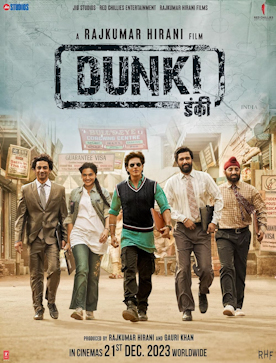
Shahrukh Khan’s Dunki and the lesser-known London Lottery have both found themselves entangled in a controversy that has stirred the cinematic landscape. Dunki, led by the legendary Bollywood actor Shahrukh Khan, has been eagerly anticipated by fans and industry enthusiasts alike, given Khan’s reputation for delivering compelling performances and successful films. The film’s release was marked by high expectations, with fans anticipating another cinematic marvel from the renowned actor.
On the other side of the narrative, “Shaikhs of India to UK,” a YouTube channel, claims that Dunki’s storyline bears striking similarities to their own production, London Lottery. London Lottery, released on July 18, 2022, seemingly holds a narrative that has drawn attention due to the alleged parallels with Dunki. This controversy has sparked discussions within the film industry and among audiences, raising questions about the origin and uniqueness of Dunki’s storyline. The claim made by “Shaikhs of India to UK” has added a layer of complexity to Dunki’s narrative, inviting scrutiny and analysis into the alleged resemblances between the two films. In this unfolding drama, the exploration of these claims becomes crucial to understanding the dynamics between Dunki and London Lottery and the potential impact on the reception of Shahrukh Khan’s latest cinematic endeavor.

In the ever-evolving realm of cinema, controversies frequently emerge, adding layers of intrigue to the narratives unfolding on the silver screen. The current buzz reverberates around the much-anticipated film, Dunki, led by none other than the iconic Bollywood figure, Shahrukh Khan. However, the spotlight has shifted from the cinematic brilliance expected from Khan to a contentious claim made by a YouTube channel known as “Shaikhs of India to UK.”
This particular channel alleges that Dunki’s storyline is not a product of creative ingenuity but rather a replication of their own 2022 release, London Lottery. As assertions of narrative mimicry echo across the virtual corridors of the film industry, this blog steps into the fray, aiming to meticulously dissect the claims, scrutinize the available evidence, and present a comprehensive perspective on the unfolding situation.
As we embark on this journey, the goal is to unravel the complexities surrounding the alleged similarities between Dunki and London Lottery. By delving into the nuances of the plots, characters, and thematic elements, we seek to provide readers with a nuanced understanding of the controversy at hand. This exploration goes beyond mere speculation, aiming to offer an informed analysis that considers both sides of the narrative.
Join us as we navigate through the twists and turns of this cinematic debate, exploring the implications for both films and pondering the broader questions it raises about originality and creativity in the world of cinema. This blog serves as a beacon, guiding readers through the fog of allegations and counterarguments, ultimately illuminating the intricacies of the Dunki vs. London Lottery controversy.
The stage is set for a cinematic clash of narratives as “Shaikhs of India to UK,” a YouTube channel, thrusts Shahrukh Khan’s much-anticipated film, Dunki, into the spotlight of controversy. The allegations, articulated by this online entity, center around the claim that Dunki’s storyline is not a product of original creation but rather a duplicated rendition of their own 2022 release, London Lottery.
At the heart of the allegations lies a fundamental assertion: that Dunki, in its narrative essence, mirrors the plot intricacies, character dynamics, or thematic elements of London Lottery. The YouTube channel posits a narrative mimicry that goes beyond mere coincidences, contending that Dunki has, intentionally or unintentionally, appropriated key elements from London Lottery.
The ensuing controversy amplifies questions regarding intellectual property, creative ownership, and the thin line between inspiration and replication in the film industry. As the allegations reverberate across social media platforms and industry discussions, the broader cinematic community finds itself at the intersection of speculation and scrutiny.
This section of the blog is dedicated to peeling back the layers of these allegations, setting the scene for a thorough examination of the claims put forth by “Shaikhs of India to UK.” As we delve deeper into the controversy, the goal is to provide readers with a clear understanding of the core contentions, the evidence presented, and the implications for both Dunki and London Lottery. Through a balanced exploration, we aim to shed light on the complexities surrounding the alleged similarities, allowing readers to form informed perspectives on this unfolding cinematic debate.
In the grand tapestry of Bollywood, few names command the same level of reverence and anticipation as Shahrukh Khan. Commonly referred to as the “Badshah of Bollywood,” Khan’s cinematic journey has been marked by iconic performances and a profound influence on the industry. Dunki, the latest addition to Khan’s filmography, has not only stirred excitement for its narrative but also heightened expectations due to the actor’s pivotal involvement.
Shahrukh Khan, synonymous with both commercial success and critical acclaim, plays a central role in Dunki, adding his signature touch to the film. As the leading force behind the project, Khan’s influence permeates every aspect of the film, from its conception to its execution. His on-screen charisma and ability to bring characters to life have made Dunki a focal point for fans eagerly awaiting his next cinematic endeavor.
The anticipation surrounding Shahrukh Khan’s films is not merely a product of celebrity fandom; it’s a testament to his ability to transcend roles and genres, creating an immersive cinematic experience for audiences worldwide. Dunki, with Khan at its helm, becomes a canvas upon which the actor’s artistry is expected to shine.
As we explore Dunki and the allegations surrounding its storyline, it becomes imperative to recognize the significance of Shahrukh Khan’s involvement. Beyond being an actor, Khan is a cultural phenomenon, and his association with Dunki amplifies both the film’s allure and the scrutiny it faces. The journey into this cinematic controversy is, in essence, a journey into the realm of Shahrukh Khan’s cinematic legacy, where each film carries the weight of expectation and the promise of a unique storytelling experience.
Dunki, the cinematic spectacle headlined by Shahrukh Khan, entered the limelight with great anticipation and curiosity surrounding its release. The film’s journey from conception to the big screen has been a subject of widespread interest, fueled by Shahrukh Khan’s legacy and the intriguing premise promised by Dunki’s trailers.
Released amid a flurry of expectations, Dunki made its mark on the box office, reportedly garnering a business of approximately Rs 200 crores thus far. This financial success, coupled with its star-studded cast and high-profile production, positions Dunki as a significant player in the film industry’s landscape.
However, the reception of Dunki has been far from uniform, as the movie has encountered a spectrum of reviews from audiences and critics alike. The initial reactions have been a mix of praise for Shahrukh Khan’s performance, the film’s production values, and a narrative that attempts to break away from conventional norms. Concurrently, critiques have surfaced, touching upon aspects of pacing, plot development, and, notably, the controversy surrounding alleged similarities with London Lottery.
The dichotomy in the reception of Dunki adds an extra layer of complexity to the ongoing controversy. As audiences grapple with their own interpretations of the film, the allegations made by “Shaikhs of India to UK” loom in the background, further influencing the discourse around Dunki.
Introduction to “Shaikhs of India to UK”: At the heart of the Dunki controversy stands the YouTube channel “Shaikhs of India to UK.” This digital platform has taken center stage by leveling significant allegations against Dunki, claiming that the film’s storyline bears an uncanny resemblance to their own production, London Lottery. “Shaikhs of India to UK” is not just a passive observer in this unfolding drama; it is the claimant, the entity that has brought the allegations to the forefront of public and industry attention
Allegations of Story Copying: The crux of the controversy lies in the claim that Dunki’s storyline is, in essence, a replicated version of London Lottery. “Shaikhs of India to UK” contends that specific elements of Dunki’s narrative mirror key aspects of their 2022 release, raising questions about creative originality, intellectual property, and the potential consequences for Dunki’s reception.
Release Date Discrepancy: A notable aspect of the Dunki vs. London Lottery controversy is the discrepancy in release dates between the two films. Understanding the timeline of their respective releases becomes crucial in determining the feasibility of narrative replication. Whether Dunki predates London Lottery or vice versa could significantly influence the credibility of the allegations.
Conclusion:
As the curtains draw on the Dunki vs. London Lottery controversy, it is imperative to distill the myriad of information and perspectives that have unfolded throughout this cinematic saga.
Final Thoughts on the Allegations: The allegations put forth by “Shaikhs of India to UK” have been meticulously examined, with a focus on dissecting the claimed similarities between Dunki and London Lottery. Through this exploration, it becomes evident that while certain parallels exist, the line between inspiration and imitation is often subjective. The intricacies of storytelling, character dynamics, and thematic elements, when closely scrutinized, reveal a nuanced landscape where creativity can take divergent paths. The legal perspectives on plagiarism add another layer to this, underlining the complexity of determining outright infringement.
In the absence of concrete evidence establishing deliberate copying, the verdict on the validity of the plagiarism claims remains elusive. What emerges is a landscape where storytelling tropes and archetypes, inherent to the cinematic language, can sometimes lead to unintentional similarities. This ambiguity invites introspection into the creative process and the fine balance between influence and imitation in the world of filmmaking.
The Impact on Dunki’s Success: The controversy surrounding Dunki, despite its financial success at the box office, has inevitably left an indelible mark on its reception. The mixed reviews from audiences and critics, coupled with the looming allegations, create a layered narrative that extends beyond the confines of the screen.
The success of Dunki, valued at approximately Rs 200 crores, demonstrates the resilience of Shahrukh Khan’s star power and the film’s inherent appeal. However, the controversy has introduced an element of skepticism that lingers in the minds of audiences. The impact on Dunki’s long-term success hinges on the industry’s response, public perception, and the film’s ability to transcend the controversy.
As we draw the final curtain on this cinematic chapter, the lasting effects of the Dunki vs. London Lottery controversy remain uncertain. The film industry, audiences, and the creators themselves are left to navigate the aftermath, contemplating the delicate balance between inspiration, creative expression, and the shadows of alleged replication in the world of storytelling.
Appendix:
For those seeking to delve deeper into the origins of the Dunki vs. London Lottery controversy and the initial allegations made by “Shaikhs of India to UK,” we provide a direct link to the source. The following link will redirect you to the YouTube video where “Shaikhs of India to UK” presents their claims and sheds light on the perceived similarities between Dunki and their film, London Lottery:
Feel free to explore the video for a firsthand look at the allegations, supporting arguments, and the initial narrative that sparked this cinematic debate. Understanding the original context and presentation of the claims can offer valuable insights into the genesis of the controversy and the subsequent discussions within the film community and among audiences.



